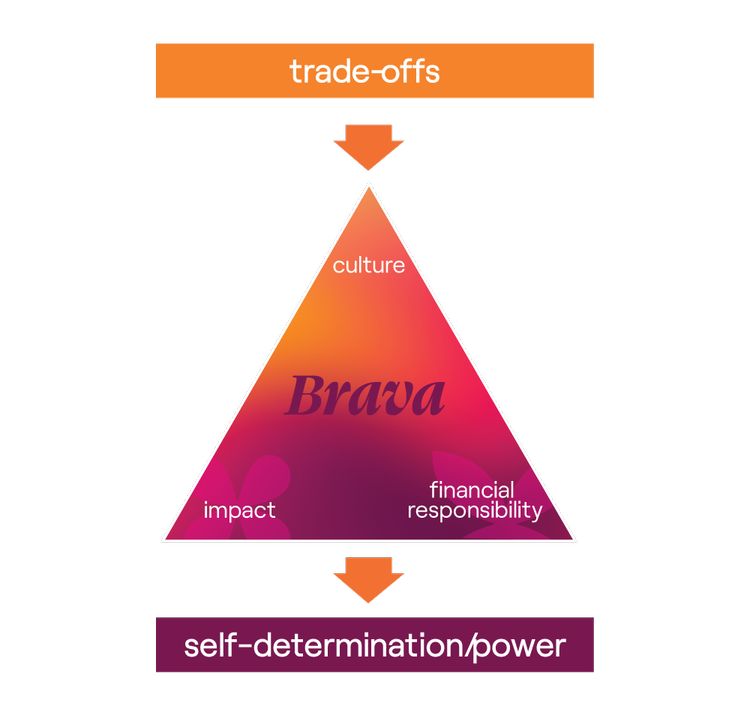Making Painful Choices with Purpose
Social change organizations are facing an unprecedented challenge: how to navigate an increasingly hostile political environment. The work of social change has required strategizing and restrategizing to deal with the new variables the rising authoritarian movement has put into play.
The Current Reality
As I write this, many of you are seeing this week's news of the Vice President of the United States threatening the entire "left-wing" non-profit ecosystem. He specifically names the Open Society Foundation and the Ford Foundation as organizations that fund those who sympathize and fund terrorists. I know non-profits that focus on people of color or immigration have gotten threatening calls from the federal administration demanding to know what they do. In the last year, I have watched 16 organizations shut down as a result of the slowdown in funding. Many more are at the brink of shutting down. Organizations that currently receive funding from foundations that are under attack may be especially vulnerable in the coming months.
The Challenge We Face
Anyone doing social change work is currently thinking critically about the amount of money they need to weather our American turn to authoritarianism. My fear in these times is how infrequently we as a sector have grappled with the tradeoffs that will need to be made. Instead, we delay painful choices, making them more painful; we dissolve into internal turmoil, disagreeing that sacrifices ever needed to be made; we start a perpetual cycle of pivots; and our teams reel from the whiplash, not knowing quite what is happening to them as team leaders reach for survival.
Our Framework: The Triangle of Tension
That is why here at Brava we start almost every engagement discussing the Triangle of Tension.
Every leader grapples with choices between three competing priorities: impact, culture, and financial responsibility. These three elements exist in constant tension with each other. Often by the time a leader with decision-making power is making a tough choice, one or two of these points must be sacrificed in order to invest in the others to increase the field of choice.
We aren't honest about how often we, as leaders, are faced with making a bet—a bet we hope but absolutely can't guarantee will pay off. We will be faced with making many bets at this moment in history. We will also be faced with making many sacrifices.
I once had a client who approached me as a result of major culture challenges they had. We would do a session with their Exec Team - decision making rights would be created and priorities would be lifted up - everyone left excited. Then the executives would go to the CEO one on one asking to be exceptions to the new boundaries. The CEO, not wanting to disappoint their people, would give the one off permission until no one was honoring the decisions they had made in the room. They didn’t want to hurt culture - so they sacrificed financial responsibility. I eventually quit the engagement. Months later I found out major layoffs happened and the entire executive team was fired. No one was holding strategic boundaries until the financial reality was unavoidable.
Reframing Our Approach to Sacrifice
When we run institutions, we often think any pain means someone messed up. Our circumstances have always required sacrifices—money and people are not infinite. At this moment, however, it will require even more tradeoffs and proactive planning. In the absence of a language for tradeoffs and an acceptance of how we are living through a painful moment that will require sacrifices, we will be unable to effectively wage battles for our collective liberation and our own personal dignity.
Right now, failing to make strategic bets is as risky as making them without intention. We cannot be frozen in place. Too much of the world—the literal world—needs us to engage in these moments to exercise the freedoms we DO have.
Taking Action
Brava will be hosting our "Strategic Sacrifice and Prioritization" session on October 3rd. I highly recommend you all sign up for it. The session focuses on our primal reactions to sacrifice and prioritization and how we can shift to be more intentional. It's one of several ways we are hoping to support organizations that are navigating these challenges.
Moving Forward Together
Reactivity will not save us. We need to be doing everything we can to keep us thinking ahead and communicating about the moment we are in. We are not served by blaming each other for sacrifices that needed to be made because of the corruption roiling this country. We need to be in community about those sacrifices. We need to grieve and mourn those sacrifices. We need to be making those sacrifices for a reason.
We have to be purposeful with our time, money, and energy. The stakes are too high for anything less than our most strategic and intentional work.


